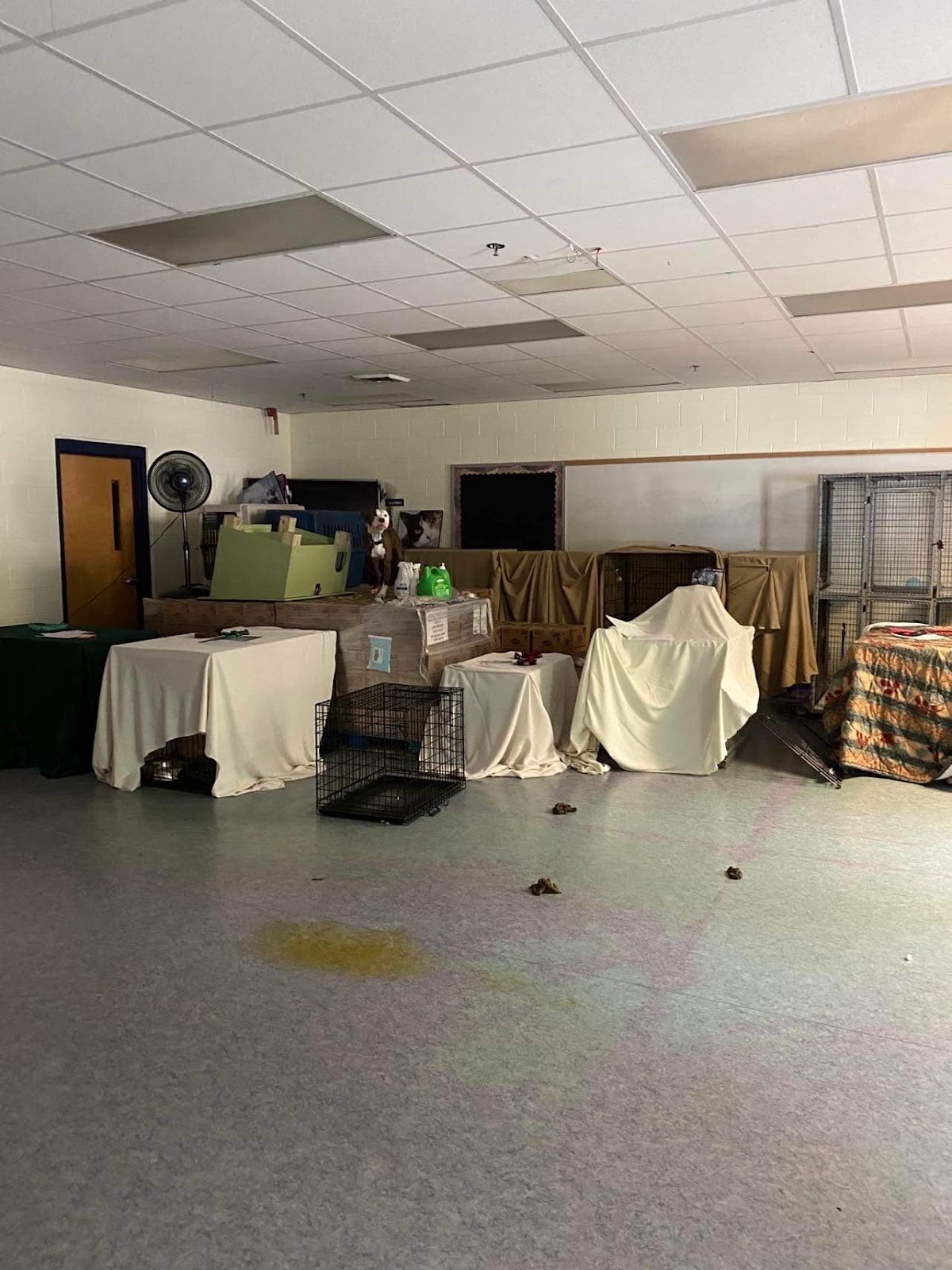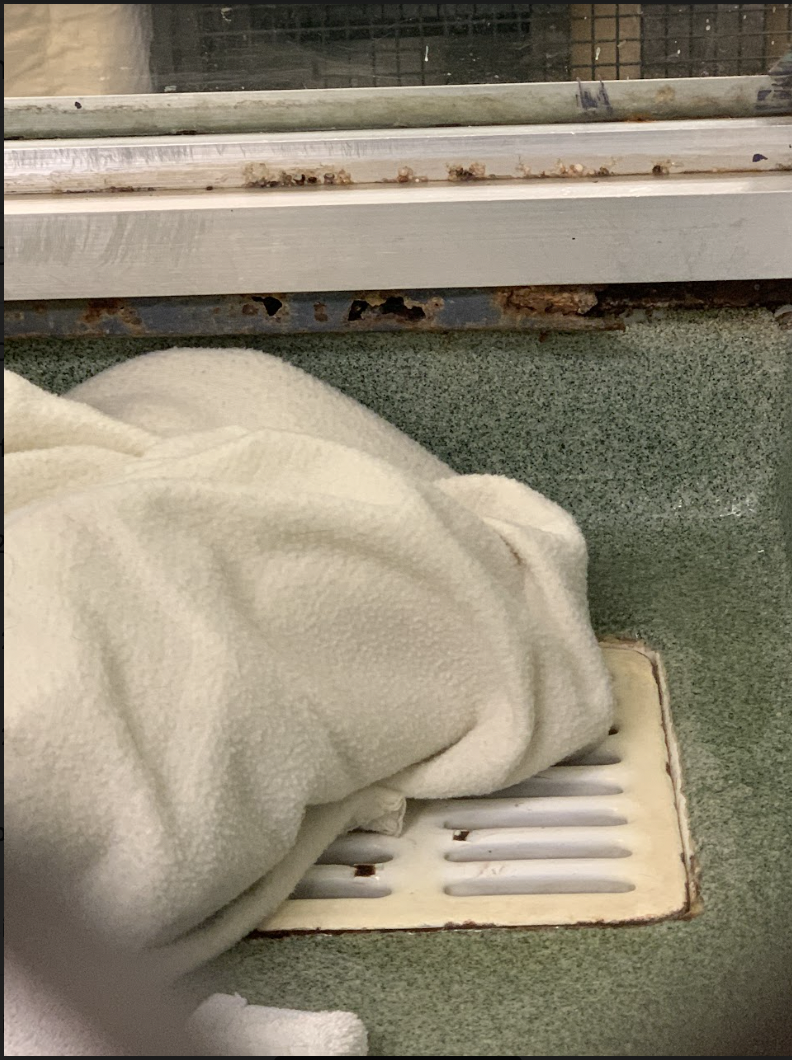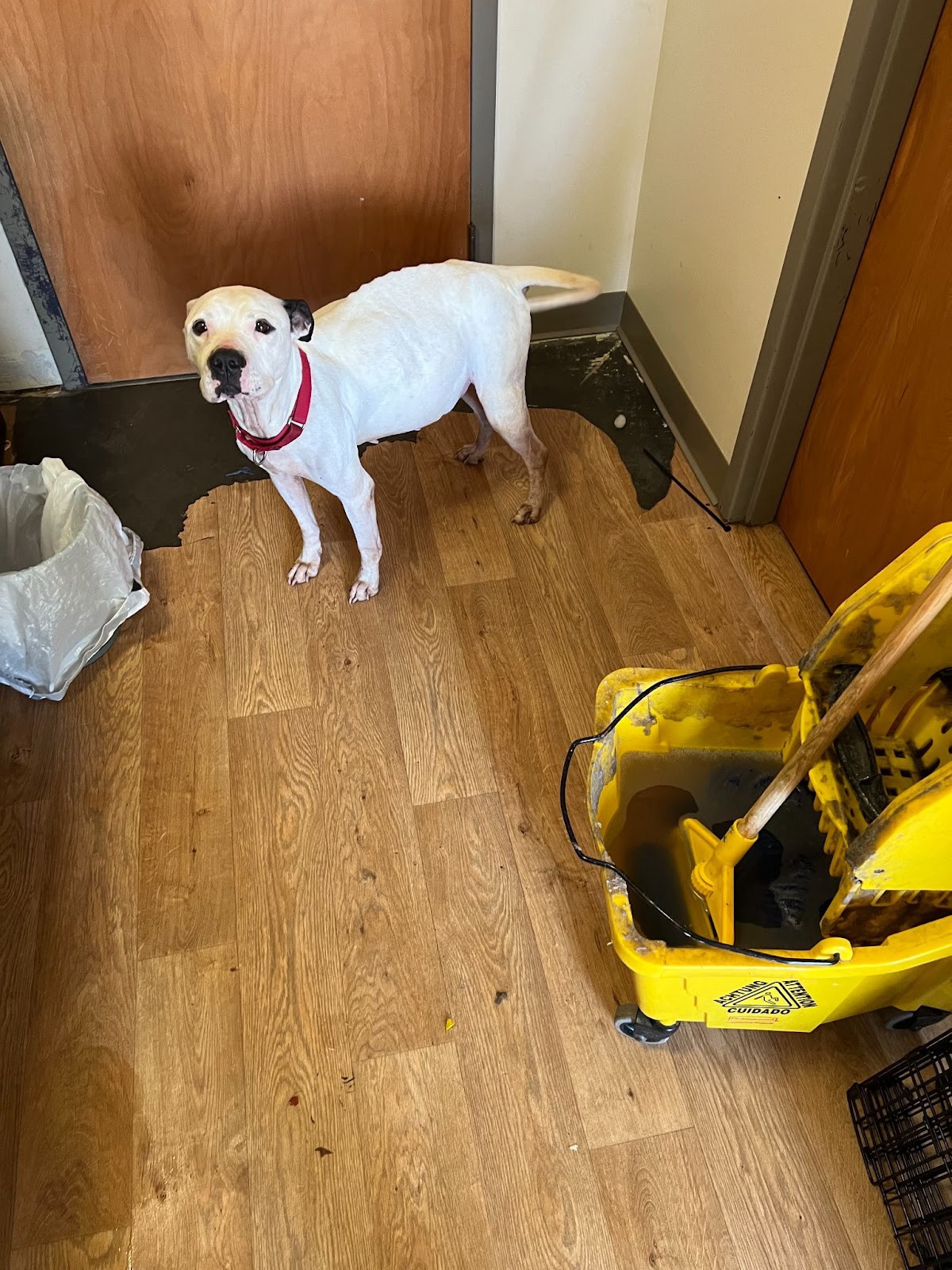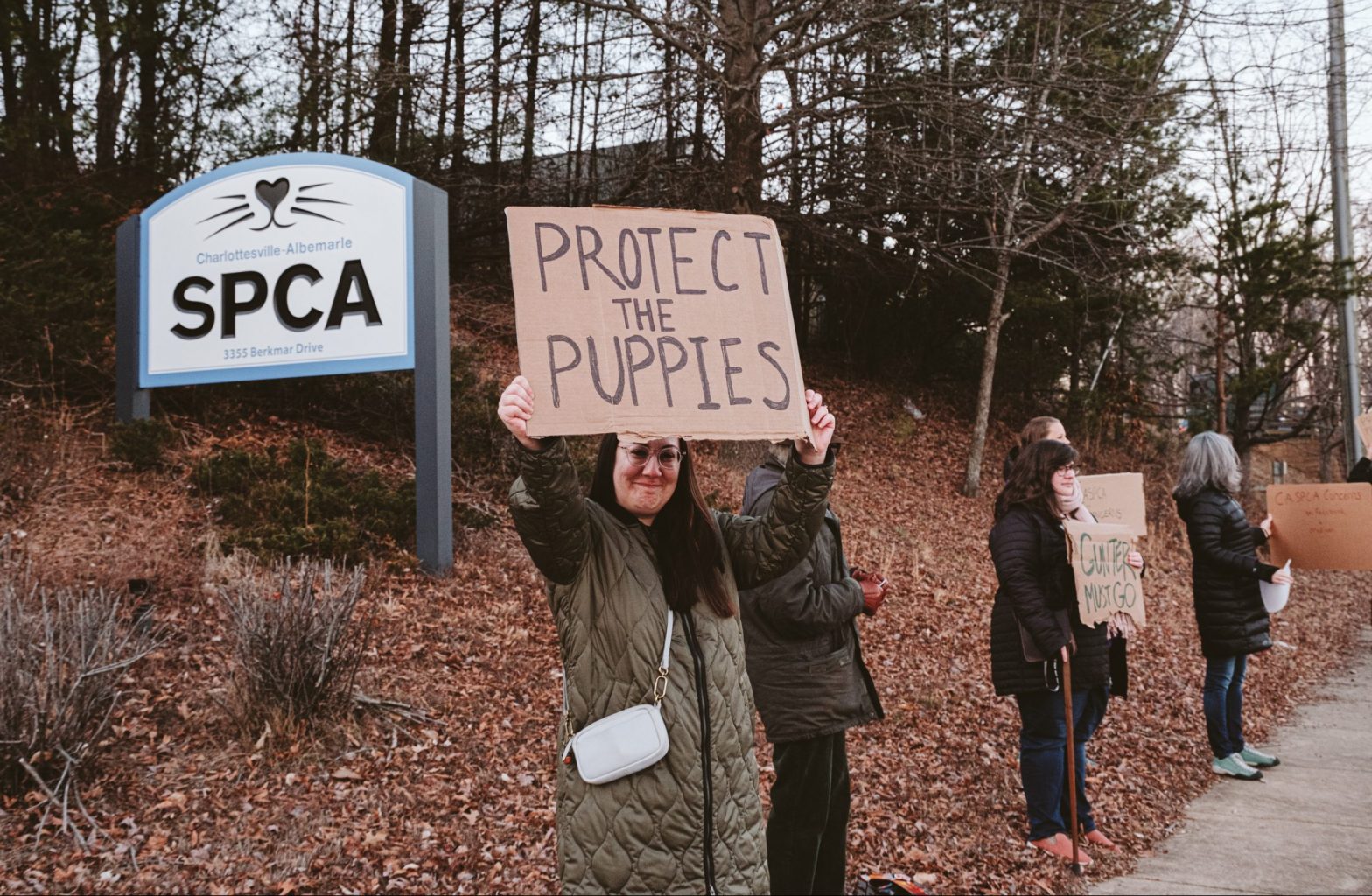The executive director and CEO of the Charlottesville-Albemarle SPCA is under fire after more than 100 current and former staff and volunteers made allegations of severe internal dysfunction and animal mistreatment at the shelter. The organization’s board of directors, however, is standing behind Angie Gunter, who has led the CASPCA since 2017, and also serves on its board.
In an anonymous letter to the 14-member board published on January 17, the group, which has named itself CASPCA Concerns, accused Gunter of creating a toxic work environment and enabling poor animal care practices, and called on the board to remove her and hire a new CEO with a “proven track record of leading collaborative and results-driven workplaces.”
“Ms. Gunter’s management style is demeaning, divisive, and punitive. She creates a culture of fear among her staff and volunteers,” reads the letter, accusing Gunter of fueling infighting; gossiping about employees; belittling, surveilling, and targeting staff; ostracizing those who voice concerns; and refusing to address problems. “She is reactionary and upends operational processes frequently. … Her stated priorities change week to week, leaving staff unable to meet ever-changing expectations.”
Gunter’s controversial behavior has led to high employee turnover and understaffing, forcing the shelter to rely on volunteers to perform essential tasks, such as cleaning cages and feeding animals, claims CASPCA Concerns. Employees often do not receive adequate training, and some are not able to safely handle animals or properly assess their needs and behaviors.
Additionally, the group accuses Gunter—who made $182,142 in 2020, according to the nonprofit’s latest Form 990—and the executive team of subjecting animals to unhealthy living conditions. Members say they have found large dogs housed in crates that are too small for them to move around in, and living in their own feces and urine. They’ve also seen dogs and cats put in isolation for months, receiving little to no enrichment and interaction, and discovered dogs suffering medical complications and in need of emergency surgery, leading to the death of one dog within the last year. And across the shelter, housing areas are in desperate need of maintenance and upgrades—but leadership continues to transfer in animals, and put the CASPCA over capacity, according to the group.
“Some cats are housed in single-compartment cages. … The windows in the Small Dog/Puppy Room have rusted frames. Hoses leak and leave standing water on the floor of the Small Dog Isolation room,” reads the letter, which includes photos of rusted windows falling apart. “Some kennels have peeling paint on the kennel floor or chewed marks in the kennel wall. The sliding internal doors that separate dog kennels are often broken.”
“Recently transferred dogs are housed in crates as there are no available kennels to accommodate them. [The] CASPCA transfers in dogs with known behavior concerns even though it does not have a canine behavior director,” the letter continues. “These dogs with behavior concerns often live in the shelter for months without finding homes.”
In addition to calling for Gunter’s removal, CASPCA Concerns urged the board to engage animal welfare and workplace consultants to “develop a plan to enact swift but long-lasting improvements,” as well as attract and hire a “more diverse set of employees.” They also encouraged the shelter to provide exit interviews, require training for the executive team, designate one board seat for an active shelter volunteer, and “offer a way for employees to express concerns without fear of retaliation.”
After the board did not immediately respond to its letter, the group sent a second one on January 23, which included an additional dozen testimonies from former staff and current volunteers. (The first letter contained statements from over 30 current and previous employees and volunteers.) The following day, Board President Jenn Corbey said the board “intends to pursue diligently the goals of making the shelter a better place,” but “we believe that Angie Gunter is the best person to lead this effort forward and she will continue to act as the CASPCA’s CEO.”
“The CEO and the Board will work closely together to ensure that your concerns about staff development, workplace enhancement, and organizational and leadership development are addressed in a meaningful way,” continued Corbey. “We ask for your patience as this process moves forward.”
In a January 27 press release, the board, represented by the public relations firm Blue Ridge Group, reiterated its support of Gunter, and denied allegations of animal mistreatment. “[Gunter’s] commitment to the animals has been exemplary, and she is committed to the wellbeing of the staff. … There has been no evidence of animal neglect or cruelty,” reads the statement, blaming staff and volunteers for “the poor treatment of the animals.”
“We will continue to work closely with the Board, the staff, the volunteers and the community with the goal of making the shelter a better place,” the statement continues.
In a January 27 WINA interview, Corbey also refuted the claims of animal mistreatment and a hostile work environment. When asked how she knew the complaints about Gunter’s management and behavior were not true, Corbey provided no details, and said the board does not speak with past employees. The board is currently conducting its own investigation, plans to hire workplace consultants and implement measures to improve the organization, and will release a statement when its investigation is complete, she said.
“We’re not taking this lightly at all. We’re reading the letters and are taking this under investigation,” said Corbey, declining to share how the board is investigating the complaints.
According to CASPCA Concerns, the shelter received a write-up for incorrect custody records and a warning regarding animals housed in the basement and offices during a 2021 state inspection. “Staff, fosters, and volunteers provide the best care to animals that they possibly can under current circumstances. The substandard care for and placement of animals is the direct result of Angie Gunter’s ineffective management style, failure to retain staff, and unqualified decision making,” reads the coalition’s January 27 statement.
In response to the board’s support of Gunter, around a dozen people held a protest outside the shelter on January 27, and former volunteer Juliet Lunka started a change.org petition calling for both Gunter and Corbey’s removal, which has over 1,300 signatures as of January 30. The CASPCA Concerns Facebook page has amassed more than 370 followers.
Toxic work environment
In the WINA interview, Corbey claimed the backlash against Gunter “came as a shock,” and she said they hadn’t received complaints about her before—however, CASPCA Concerns says these allegations against Gunter and the shelter’s executive team are not new. In 2018, former executive assistant Tomeka Rhoades sent the board a five-page letter following her resignation, claiming Gunter repeatedly demeaned her, gossiped about other employees and board members, yelled and cursed at her, and tried to control her, among other inappropriate behavior.
“I feel that I have been a victim of mental, verbal, emotional abuse, bullying, and discrimination. It felt like every day I was reminded of how smart I wasn’t or talked to like a juvenile or treated like a slave,” wrote Rhoades, who worked at the SPCA for a year. “I left the shelter almost every day in tears.”
The following year, former volunteer Kristin Swenson sent a 13-page letter to the board, sharing concerns about the shelter’s poor animal care practices and toxic work environment. And in 2021, an anonymous employee sent the board president a nine-page letter alerting them of poor leadership, high turnover, and other critical issues.
After resigning last year, one former shelter employee, who wishes to remain anonymous out of fear of retaliation, says they heard about similar negative experiences from many people who had resigned before them and those who left after them. “So I started reaching out to people and slowly but surely, I got [CASPCA Concerns] going,” says the former employee, who worked at the shelter for a year and a half.
At the shelter, the employee says they did not receive training, and witnessed Gunter pit employees against each other and use gossip against those she disliked.
“It is literally the behavior of a bully,” they claim. Gunter and the executive team “didn’t care that I was staying 12 hours a day [or] that I care about the animals. They basically made my life so miserable there that I had to leave for my own mental health.”
Last year, the Charlottesville-Albemarle SPCA placed a record number of pets in adoptive homes, achieving a 99 percent live release rate for dogs and 98 percent rate for cats—yet this success is “built on a crumbling foundation,” and cannot last much longer, claims CASPCA Concerns. Due to the shelter’s toxic work environment, the group says that at least 50 employees have resigned since November 2021, and at least 30 directors, managers, and other non-entry-level staff have resigned since January 2020. Seventeen job openings—including multiple manager and coordinator positions—are listed on the CASPCA’s website as of January 30.
Following the board’s refusal to fire Gunter, Animal Care Manager Courtney Ott resigned on January 25, describing the mistreatment she experienced and witnessed.
“The recent response from [Corbey] solidifies that this toxic environment will continue to be an issue,” wrote Ott in a letter to the board. “This acceptance and ignorance of mistreatment is so much deeper than I thought.”
“Those of us who are sweating, crying, and breaking our bodies to care for these animals the best we can day in and day out,” wrote Ott, “are treated as just replaceable numbers.”
Animal mistreatment
Shelter whistleblowers have raised the alarm about numerous types of poor animal care and treatment.
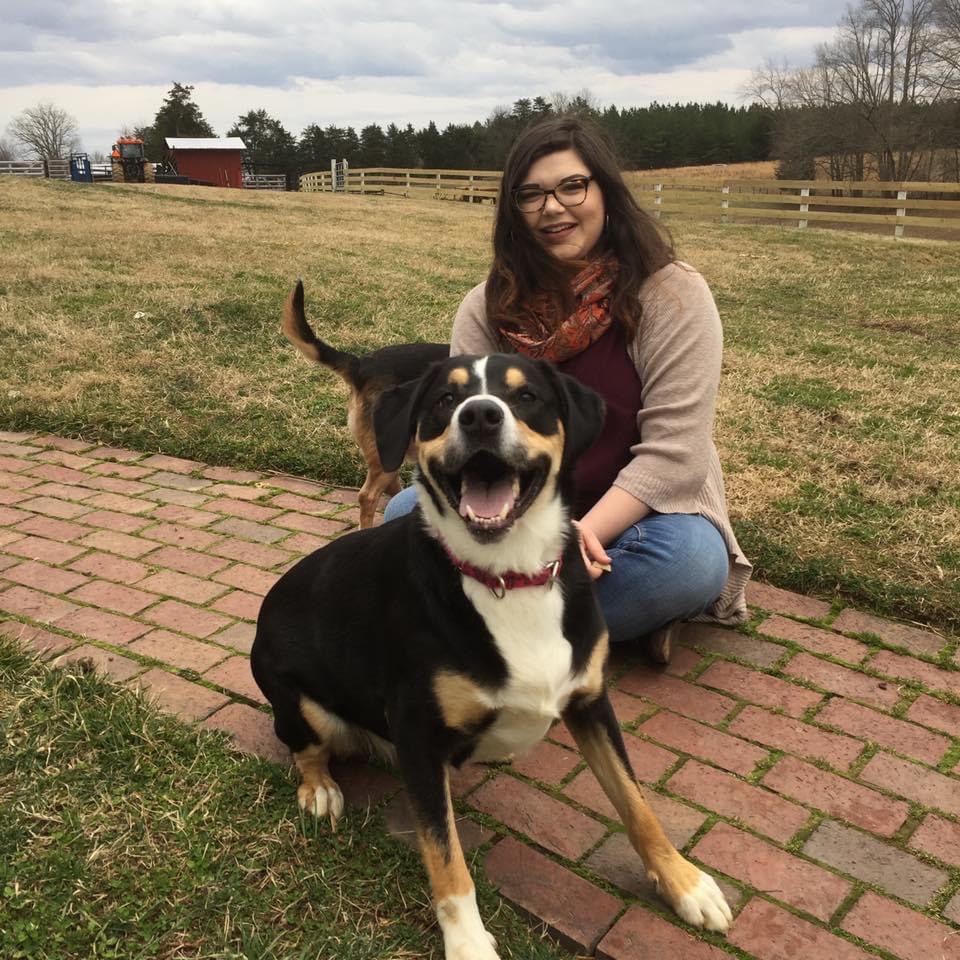
They claim dogs with behavior concerns are isolated without placement plans, and are unavailable for adoption for months. “There were multiple instances where we would adopt out dogs that have significant bite histories into the public without proper counseling with the adopters,” including an instance in which a dog, who was later euthanized, bit off an adopter’s ear, says Katie Roche, who served as the shelter’s adoption and intake coordinator, humane education and outreach coordinator, and an adoption counselor.
There are currently three dogs up for adoption that have killed other dogs, but it is not mentioned in their online biographies, claims Roche, who resigned in 2021. A fourth available dog was involved in an altercation that led to another dog’s euthanasia. Additionally, Roche accuses the executive team of transferring in too many animals—including those with contagious, deadly illnesses. During her three years at the shelter, she says she saw many dogs forced to live in crates due to housing areas being at capacity.
In CASPCA Concerns’ January 17 letter, several photos from recent years show dogs housed in crates, while a 2021 photo shows three puppies and an adult dog housed in an exercise pen, with feces and urine covering the floor. (Corbey claimed these photos were “false.”)
Former adoption and intake manager and dog care lead Claire Allen echoes concerns about untrained staff, rampant overcrowding, and dangerous dogs. She claims she was instructed to hide dogs in play parks, offices, and other areas, and forge custody records during an inspection.
“Despite voicing the shortage of space numerous times, it fell on deaf ears,” says Allen, who left the shelter in 2018 after working there for three years, in a letter to the board. “Dogs harming themselves and circling in their crates were left to suffer for the sake of maintaining a high live release rate.”
When Allen later became an animal control officer for the City of Charlottesville, “behavioral evaluations were discontinued entirely, and Animal Control’s direct access to the shelter’s informational database was taken away,” she said. “When I would ask for updates on particular animals, staff would have no knowledge of what was going on.”
CASPCA Concerns says it will continue to gather evidence of employee and animal mistreatment, and send letters to the board and publish them online—until leadership meets its demands. In addition, the group urges people to email the board, volunteer at the shelter, and foster or adopt an animal in need of a safe, loving home.
“People are getting pretty upset. They’re saying they’re not going to volunteer or give money to the shelter. The board needs to take this seriously,” says the former employee who started the coalition. “We are strong, we are united, and we’re not giving up.”
Caged in
In photos shared by CASPCA Concerns, multiple dogs can be seen housed in crates and cages, with feces and urine covering the floor—evidence of poor animal care and treatment, the group claims.
